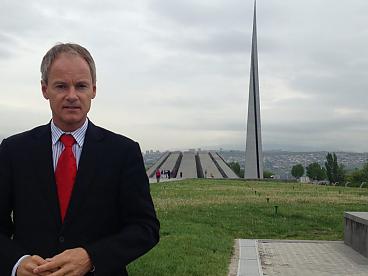EU must not turn its back on Armenia
EU must not turn its back on Armenia

This week SP parliamentary foreign affairs spokesman Harry van Bommel is in Armenia at the head of a Dutch delegation. Prior to the visit, he wrote the following piece about the relationship between the EU and Armenia, and the opportunities offered by the future. His article was published in an Armenian newspaper and is reproduced in translation below.
In September 2013 Armenia decided to apply for membership of the Eurasian Economic Union, thereby intensifying relations with Russia and putting an abrupt end to negotiations on an Association Agreement with the EU. Considering Armenia’s position in the geopolitical power game, this rapprochement with Russia is understandable. At the same time it is not without its dangers, in the view of Dutch Member of Parliament Harry van Bommel, who visits Armenia this week with a parliamentary delegation.
Armenia’s opting for closer relations with Russia can not be seen as separate from the country’s dependence on its neighbour. Primarily in the area of economics, this dependence is extensive, especially when it comes to energy. There are also sizable remittances to families at home from Armenians working in Russia. In addition to these economic interests there is the Russian position as guarantor of Armenia’s security, though on the other hand the great Russia bear also brings insecurity, for example by supplying extensive armaments to Armenia’s neighbour Azerbaijan. All in all accession to the Eurasian Economic Union (EEU) means that Armenia’s dependence on Russia will increase still further.
Rapprochement with Russia must also be placed in the regional context. The war between Georgia and Russia in August 2008, when the Russia army reacted to a Georgian offensive in the country’s north, is relevant here. Since then Georgia has lost control over the regions of Abkhazia and South Ossetia. Many analysts see this Russian reaction as having been forced by a western drive to the east, for which the EU, the US and NATO are all responsible. The disastrous developments in Ukraine, which began, it’s true, after Armenia’s application for membership of the Russian Customs Union, also show what can happen if the vital interests of neighbours like Russia are involved. It appears that there is a limit which cannot be crossed.
Developments in Georgia and Ukraine, as well for example as those in Moldavia, make it clear that it is of huge importance that the west and Russia find a solution to rapidly escalating tensions. If not, we’re simply waiting for the next crisis to break out. It is therefore crucial that a way is found for countries of the former Soviet Union to intensify relations with both Russia and the EU. They must not be forced to choose between one and the other. It’s important that within the EU this broader context be well understood and the Armenian approach to Russia not be interpreted as a ‘no’ to Europe. The EU must then also not turn its back on Armenia, but instead look for an intensification of relations which remains possible even now that Armenia has joined Russia in the EEU.
What all of this means is that the EU and its separate member states have not seized the opportunity presented by the centenary commemoration of the Armenian genocide to give a boost to relations with Armenia represents a missed opportunity. This applies all the more given that Russia last month gave the mass-murder of Armenians its correct name of ‘genocide’. President Putin was present at the commemoration in Yerevan. From the EU, however, there remains only a deafening silence. Perhaps this week’s historic visit to Armenia from the Parliament of the Netherlands can help just a little to put that right.
